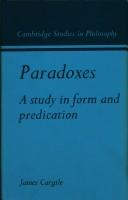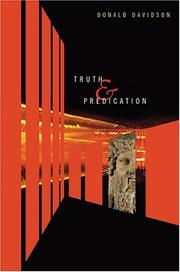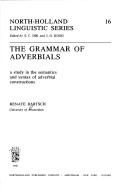| Listing 1 - 6 of 6 |
Sort by
|

ISBN: 0521224756 Year: 1979 Publisher: Cambridge Cambridge University press
Abstract | Keywords | Export | Availability | Bookmark
 Loading...
Loading...Choose an application
- Reference Manager
- EndNote
- RefWorks (Direct export to RefWorks)
Logic --- Form (Logic) --- Paradox --- Predicate (Logic) --- Reference (Philosophy) --- Referring, Theory of --- Theory of referring --- Philosophy --- Predicables (Logic) --- Predication (Logic) --- Categories (Philosophy) --- Language and logic --- Figures of speech --- Contradiction --- Logical form --- Paradox. --- Form (Logic). --- Predicate (Logic). --- Reference (Philosophy).

ISBN: 0674015258 9780674015258 0674030400 0674030222 9780674030220 9780674030404 Year: 2005 Publisher: Cambridge, Mass. The Belknap Press of Harvard University Press
Abstract | Keywords | Export | Availability | Bookmark
 Loading...
Loading...Choose an application
- Reference Manager
- EndNote
- RefWorks (Direct export to RefWorks)
This brief book takes readers to the very heart of what it is that philosophy can do well. Completed shortly before Donald Davidson's death at 85, Truth and Predication brings full circle a journey moving from the insights of Plato and Aristotle to the problems of contemporary philosophy. In particular, Davidson, countering many of his contemporaries, argues that the concept of truth is not ambiguous, and that we need an effective theory of truth in order to live well. Davidson begins by harking back to an early interest in the classics, and an even earlier engagement with the workings of grammar, in the pleasures of diagramming sentences in grade school, he locates his first glimpse into the mechanics of how we conduct the most important activities in our life - such as declaring love, asking directions, issuing orders, and telling stories. Davidson connects these essential questions with the most basic and yet hard to understand mysteries of language use - how we connect noun to verb. This is a problem that Plato and Aristotle wrestled with, and Davidson draws on their thinking to show how an understanding of linguistic behavior is critical to the formulating of a workable concept of truth. Anchored in classical philosophy, Truth and Predication nonetheless makes telling use of the work of a great number of modern philosophers from Tarski and Dewey to Quine and Rorty. Representing the very best of Western thought, it reopens the most difficult and pressing of ancient philosophical problems, and reveals them to be very much of our day.
Mathematical logic --- Theory of knowledge --- Predicat (Logique) --- Predicate (Logic) --- Predikaat (Logica) --- Truth --- Vérité --- Waarheid --- Truth. --- Predicate (Logic). --- Predicables (Logic) --- Predication (Logic) --- Categories (Philosophy) --- Language and logic --- Logic --- Conviction --- Belief and doubt --- Philosophy --- Skepticism --- Certainty --- Necessity (Philosophy) --- Pragmatism --- Croyance (philosophie) --- Foi --- Prédication --- Prédicat (logique) --- Christianisme
Book
ISBN: 0701118598 Year: 1973 Publisher: Edinburgh Scottish Academic Press
Abstract | Keywords | Export | Availability | Bookmark
 Loading...
Loading...Choose an application
- Reference Manager
- EndNote
- RefWorks (Direct export to RefWorks)
Mathematical logic --- Signification (Logic) --- Semantics (Philosophy) --- Predicate (Logic) --- Signifiance --- Sémantique (Philosophie) --- Prédicat (logique) --- Significance logic --- Logic --- Intension (Philosophy) --- Logical semantics --- Semantics (Logic) --- Semeiotics --- Significs --- Syntactics --- Unified science --- Language and languages --- Logic, Symbolic and mathematical --- Logical positivism --- Meaning (Psychology) --- Philosophy, Modern --- Semiotics --- Signs and symbols --- Symbolism --- Analysis (Philosophy) --- Definition (Philosophy) --- Predicables (Logic) --- Predication (Logic) --- Categories (Philosophy) --- Language and logic --- Predicate (Logic). --- Semantics (Philosophy). --- Signification (Logic). --- Sémantique (Philosophie) --- Prédicat (logique)

ISBN: 0444109641 0720462061 9780444109644 Year: 1976 Volume: 16 Publisher: Amsterdam North-Holland
Abstract | Keywords | Export | Availability | Bookmark
 Loading...
Loading...Choose an application
- Reference Manager
- EndNote
- RefWorks (Direct export to RefWorks)
Lexicology. Semantics --- Grammar --- Grammar, Comparative and general --- Mathematical linguistics --- Generative grammar --- Predicate (Logic) --- Adverbiaux --- Linguistique mathématique --- Grammaire générative --- Prédicat (logique) --- Adverbials --- Adverb --- Grammar, comparative and general --- -Mathematical linguistics --- 801.56 --- Predicables (Logic) --- Predication (Logic) --- Categories (Philosophy) --- Language and logic --- Logic --- Algebraic linguistics --- Language and languages --- Linguistics --- Linguistics, Mathematical --- Applied linguistics --- Information theory --- Computational linguistics --- Comparative grammar --- Grammar, Philosophical --- Grammar, Universal --- Philosophical grammar --- Philology --- Grammar, Generative --- Grammar, Transformational --- Grammar, Transformational generative --- Transformational generative grammar --- Transformational grammar --- Psycholinguistics --- Syntaxis. Semantiek --- Statistical methods --- Mathematical models --- Grammar, Comparative --- Derivation --- Generative grammar. --- Mathematical linguistics. --- Adverb. --- 801.56 Syntaxis. Semantiek --- Predicate (Logic). --- Linguistique mathématique --- Grammaire générative --- Prédicat (logique) --- Connectives --- Grammar, Comparative and general - Adverb
Book
ISBN: 0416822002 0416821901 9780416821901 Year: 1974 Publisher: London Methuen
Abstract | Keywords | Export | Availability | Bookmark
 Loading...
Loading...Choose an application
- Reference Manager
- EndNote
- RefWorks (Direct export to RefWorks)
800 --- #SBIB:309H514 --- #SBIB:16G --- 800 Taalwetenschap. Taalkunde. Linguistiek --- Taalwetenschap. Taalkunde. Linguistiek --- Linguistiek --- Logica en wetenschapsleer --- Subject (Philosophy) --- Sujet (Philosophie) --- Sujet et prédicat --- Topic and comment --- -Predicate (Logic) --- Predicables (Logic) --- Predication (Logic) --- Subject (Philosophy). --- Prédicat (logique) --- Sujet et prédicat --- Grammar, Comparative and general --- Comparative grammar --- Grammar --- Grammar, Philosophical --- Grammar, Universal --- Language and languages --- Philosophical grammar --- Grammar, Comparative --- Predicate (Logic) --- Philosophy --- Categories (Philosophy) --- Language and logic --- Logic --- Functional sentence perspective (Grammar) --- Predicate and subject (Grammar) --- Subject and predicate (Grammar) --- Theme and rheme --- Topic and comment (Grammar) --- Focus (Linguistics) --- Subject and predicate --- Syntax --- Philosophy of language --- Mathematical logic --- Predicate (Logic). --- Topic and comment. --- Language and logic. --- Linguistics --- Philology
Book
ISBN: 9780674724549 0674724542 0674726359 0674727541 9780674726352 9780674727540 Year: 2013 Publisher: Cambridge, MA
Abstract | Keywords | Export | Availability | Bookmark
 Loading...
Loading...Choose an application
- Reference Manager
- EndNote
- RefWorks (Direct export to RefWorks)
Aristotle was the founder not only of logic but also of modal logic. In the Prior Analytics he developed a complex system of modal syllogistic which, while influential, has been disputed since antiquity--and is today widely regarded as incoherent. Combining analytic rigor with keen sensitivity to historical context, Marko Malink makes clear that the modal syllogistic forms a consistent, integrated system of logic, one that is closely related to other areas of Aristotle's philosophy. Aristotle's modal syllogistic differs significantly from modern modal logic. Malink considers the key to understanding the Aristotelian version to be the notion of predication discussed in the Topics--specifically, its theory of predicables (definition, genus, differentia, proprium, and accident) and the ten categories (substance, quantity, quality, and so on). The predicables introduce a distinction between essential and nonessential predication. In contrast, the categories distinguish between substantial and nonsubstantial predication. Malink builds on these insights in developing a semantics for Aristotle's modal propositions, one that verifies the ancient philosopher's claims of the validity and invalidity of modal inferences. While it acknowledges some limitations of this reconstruction, Aristotle's Modal Syllogistic brims with bold ideas, richly supported by close readings of the Greek texts.
Logic, Ancient. --- Modality (Logic) --- Syllogism. --- Predicate (Logic) --- Logique ancienne --- Modalité (Logique) --- Syllogisme --- Prédicat (logique) --- Aristotle. --- Aristotle. -- Prior analytics. --- Predicables (Logic) --- Predication (Logic) --- Ancient logic --- Categories (Philosophy) --- Language and logic --- Logic --- Argumentation --- Reasoning --- Logic, Symbolic and mathematical --- Modal logic --- Nonclassical mathematical logic --- Bisimulation --- Aristoteles --- Aristote --- Aristotle --- Aristotile --- Logic, Ancient --- Syllogism --- Aristoteles. --- Arisṭāṭṭil --- Aristo, --- Aristotel --- Aristotele --- Aristóteles, --- Aristòtil --- Arisṭū --- Arisṭūṭālīs --- Arisutoteresu --- Arystoteles --- Ya-li-shih-to-te --- Ya-li-ssu-to-te --- Yalishiduode --- Yalisiduode --- Ἀριστοτέλης --- Αριστοτέλης --- Аристотел --- ארסטו --- אריםטו --- אריסטו --- אריסטוטלס --- אריסטוטלוס --- אריסטוטליס --- أرسطاطاليس --- أرسططاليس --- أرسطو --- أرسطوطالس --- أرسطوطاليس --- ابن رشد --- اريسطو --- Pseudo Aristotele --- Pseudo-Aristotle --- アリストテレス
| Listing 1 - 6 of 6 |
Sort by
|

 Search
Search Feedback
Feedback About UniCat
About UniCat  Help
Help News
News